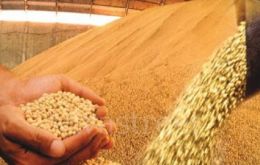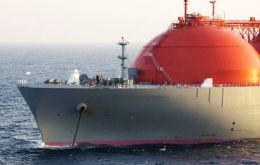MercoPress. South Atlantic News Agency
Economy
-
Monday, September 28th 2015 - 10:45 UTC
Record soy and corn crops forecasted in South America because of stronger dollar and El Niño

A combination of weather, currency and political factors should result in another huge South American crop of corn and soybeans, further depressing grain and oilseed prices, says an analyst, according to a report from Canada's The Western Producer.
-
Monday, September 28th 2015 - 10:35 UTC
Brazil has sufficient reserves, but Rousseff concerned about companies with dollar debts

Brazil President Dilma Rousseff cited the nation's foreign currency reserves as a backstop to excessive volatility and weakness in the Brazilian Real.
-
Monday, September 28th 2015 - 10:05 UTC
“One billion tourists, one billion opportunities”, UN message on World Tourism Day

Marking the observance of World Tourism Day, senior United Nations officials are spotlighting the transformative potential of one billion tourists and their increasing capacity to help boost socio-economic and environmental development.
-
Sunday, September 27th 2015 - 09:27 UTC
Brazil unemployment up for eighth month running; double December's rate

Brazil's unemployment rate rose for an eighth straight month in August to the highest in over five years, although the increase was slightly smaller than markets expected. The non-seasonally adjusted jobless rate rose in August to 7.6%, from 7.5% in July, statistics agency IBGE said.
-
Saturday, September 26th 2015 - 09:43 UTC
US dollar in Argentina at an all time record of 16.08 Pesos

The unofficial or 'blue' US dollar exchange rate in Argentina hit an all-time high of 16.08 Pesos at the end of trading on Friday, due in part to policy uncertainty ahead of the October 25 presidential election, according to local market sources.
-
Saturday, September 26th 2015 - 09:04 UTC
Bill & Melinda Gates foundation sues Petrobras alleging 'pervasive bribery'

Bill & Melinda Gates Foundation have sued Petrobras to recoup stock losses stemming from a corruption scandal at the state-run oil company.
-
Saturday, September 26th 2015 - 08:03 UTC
Petrobras increases LPG price 11% for commercial and industrial clients

Petrobras announced that the price of liquefied petroleum gas (LPG) for commercial and industrial clients has risen 11%, effective midnight Friday. The company said the increase does not affect the price of LPG sold in smaller containers for residential uses such as household cooking, which rose 15% on September first.
-
Saturday, September 26th 2015 - 07:43 UTC
Falklands' oil companies agree to resume drilling at successful Sea Lion prospect

Falkland Oil and Gas PLC on Friday announced it has agreed with Rockhopper Exploration PLC and Premier Oil PLC to drill another well on the Isobel/Elaine complex to replace the planned Jayne East well.
-
Friday, September 25th 2015 - 23:14 UTC
“My most urgent task is to win back trust for the VW Group” said new CEO Mueller

Matthias Mueller has been named as Volkswagen (VW) chief executive in the wake of the scandal of rigged emissions tests in diesel cars. He succeeds Martin Winterkorn, who resigned on Wednesday. Mr. Mueller is a veteran hand of the company and was head of Posche's sports car division.
-
Friday, September 25th 2015 - 07:26 UTC
Argentina remains 'reluctant' and has 'reserves' about a trade accord Mercosur/ Europe

Mercosur foreign ministers meeting held this week in Paraguay to decide on the proposal to present the European Union for a trade agreement, apparently was not as “satisfactory” as announced because of Argentina's reluctance and 'reserves' about opening its market to the EU.
